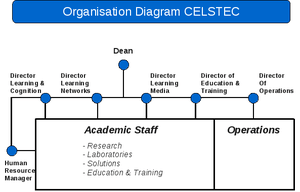CELSTEC
Coordinates: 50°52′40.60″N 5°57′30″E / 50.8779444°N 5.95833°E
The Centre for Learning Sciences and Technologies (CELSTEC) is a Dutch research centre in the fields of Learning sciences and Technology Enhanced Learning, and part of the Open University of the Netherlands.

CELSTEC is mainly targeted at carrying out research and development (R&D) projects. But furthermore, the centre also tests, implements and provides sustainable solutions to various partners within and without the OUNL. These solutions build on R&D and are evidence-based. Both R&D projects and solutions contribute to the advancement of learning at the workplace, in educational institutes, at home and while on the move.
Programmes
CELSTEC's activities are concentrated in three programmes:
- Learning and Cognition: Design and support for Expertise Development
- Learning Networks for Professional Learning
- Learning Media
Besides these three programmas, the CELSTEC Education & Training Institute disseminates expertise by offering education and training activities, like a master programme Learning Sciences (MSc).
The R&D programmes contain a combination of research projects, education and training activities, open innovation laboratory projects, and the provision of solutions to educational problems and needs, both within the Open University of the Netherlands and outside (other schools, companies and organisations).
An external assessment of the quality of the research programmes has been executed by QANU (Quality Assurance Netherlands Universities ) and published under the title Research assessment Pedagogics and Education Science 2007.
Learning and Cognition
The Learning and Cognition programme aims at the development of theory and grounding principles for the design of effective and efficient learning arrangements for education and training in complex cognitive domains. This is realized by uncovering the cognitive processes (see cognition) that underlie learning, and by using our knowledge of those cognitive processes and the learner's cognitive system to inform the design of learning tasks, learning environments and learning assessments. Research in this programme focuses on one of three themes: Learning tasks; Learning environments; and Learning Assessments.
Learning Networks for Professional Development
The Learning Networks programme addresses the needs of professional learners, taking their individual employability concerns as point of departure, and translating them into competence development needs. The assumption of the programme is that a Learning Network is a suitable tool to develop the competences professional learners need. The research in this programme aims to answer the question of how a network structure can be designed and developed to produce the expected learner outcomes and economic viability. Research in this programme focuses on one of three themes: Professional development; Professional learning community; and Learning network support services.
Learning Media
The goal of the Learning Media programme is to establish innovative, challenging and pervasive ways of learning and teaching that exploit the opportunities of emerging technologies, media technologies and devices. This includes wide-band internet and mobile network technologies as well as user-generated content and a variety of new portable communication devices. Research in this programme focuses on one of three themes: Immersive Media; Social Media (see Social software in education); and Mobile Media (see mobile learning).
History
The institute has its roots in the very beginning of the Open University of the Netherlands. In the beginning, the aim was to develop educational distance teaching courses, using the new technologies that were available at that time. It was a period of production of about 40 distance teaching courses a year, including TV productions on public television, printed materials, Interactive Video Discs for simulated practicals. The average course duration was 120 study hours for students, most of it was related to studying written materials that were sent to their homes.
On the history of the institution:
WOLF Henk de, Open Universiteit Nederland: Beeld van een instelling in de voorhoede van de onderwijsvernieuwing (Open Universiteit Nederland: Portrait of an institution in the vanguard of educational innovation). eigen beheer 1999, 288 pag., hardcover, ills, bibl., 17x22 /4.
SCHLUSMANS Kathleen, e.a. (red), Een leven lang eigenwijs studeren: het onderwijs van de Open Universiteit Nederland (A life of smart-ass studying: the education of the Open Universiteit Nederland). 2009, 314 p, softcover, ills.